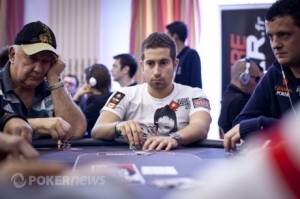I recently played a few events at the Borgata Fall Open. I got 62nd out of 970 in Event 1 for $1,129, final-tabled Event 3 for $2,770 and min-cashed in Event 8 for $777. I’m not bragging because I should’ve won the event I final-tabled. Day 1 of the first event featured a key hand where I changed my plan when a specific card hit the river. The pot wasn’t that large, but it was what I learned during the hand that I feel is important and should be part of every player’s game. There are times when you have a plan for a hand and something changes; it could be a tell or it could be a read on someone’s bet-sizing; it could be a certain card that hits the board. It doesn’t matter. The point is to be flexible enough to change your game plan in real time.
I had two pair on the turn on a three-heart board. I led for about three-quarters of the pot, intending to fold to a raise because this specific opponent is never raising with worse. He’s never semibluffing with a naked heart or turning a one-pair type hand into a bluff. He double-checks his cards and calls my bet quickly. Pretty obvious he has a flush draw of some sort. The board was 7-6-2-Q. He had limped in late position, so I can rule out  -Qx combos as he probably would’ve raised preflop. I had 7-6 in my hand so it made it more difficult for him to have
-Qx combos as he probably would’ve raised preflop. I had 7-6 in my hand so it made it more difficult for him to have  -7x or
-7x or  -6x.
-6x.
He liked to float non-threatening flops then just give up on most turns when he didn’t improve, which is basically lighting money on fire. When in position I would isolate him preflop with the intention of c-betting every flop then just barreling 100 percent of turns. In this case I was fairly certain he had floated my flop bet with ace-high (if your going to float, try to do it in position so it’s easier to take the pot away later) and picked up a flush draw on the turn.
Also he could’ve had a hand like Qx- . I bet the turn and he called quickly. The river was the
. I bet the turn and he called quickly. The river was the  . Against Level 1 players I like to check most rivers when a draw misses to induce. They tend not to think about your range and how you must have showdown value because you checked, instead they think, “Wow, I missed and my opponent checked so I should bluff.”
. Against Level 1 players I like to check most rivers when a draw misses to induce. They tend not to think about your range and how you must have showdown value because you checked, instead they think, “Wow, I missed and my opponent checked so I should bluff.”
I was about to check, but recently I’ve been taking more time to make my decisions. I started thinking about how a black ace or king changes the hand. Given the holdings I eliminated from his range earlier, he could have a random  , and has just improved to top pair. Why check to induce if he’s probably just going to check back with A-5?
, and has just improved to top pair. Why check to induce if he’s probably just going to check back with A-5?
I decided to value-bet the river, almost the size of the pot. He’s incapable of folding an ace and his raising range on the river in this case is a function of my bet size. He’s not going to raise my large bet with just one pair, so I can easily fold if he raises. As I anticipated he snap-called with  –
– and I won a nice-sized pot.
and I won a nice-sized pot.
The moral is to be flexible enough in your thinking to be able to change your plan when an interesting card hits the board. Take an extra second to re-evaluate how different cards change the dynamic of the hand. When you act quickly, your game is on auto-pilot, which is bad for many reasons. Stay flexible, breathe and take an extra second. … event the cool kids are doing it.
— Michael is a team pro at surebetpoker.net. Email him at MichaelJWolf33@gmail.com and follow his adventures on Twitter @mikewolf7.




